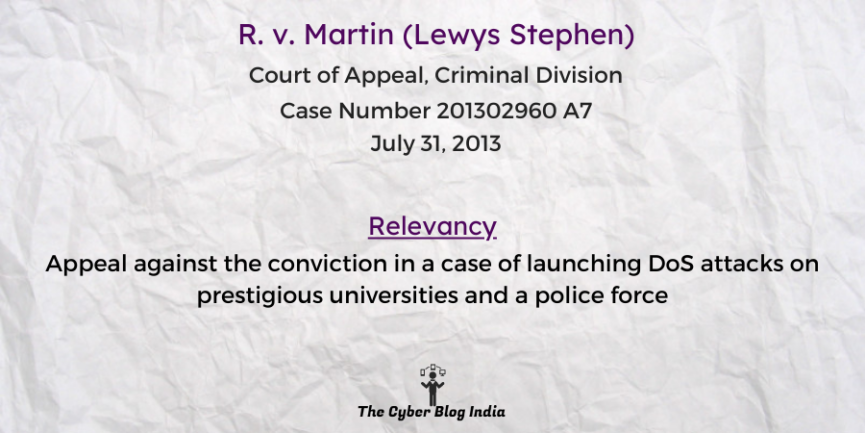R. v. Martin (Lewys Stephen)

R. v. Martin (Lewys Stephen)
[2013] EWCA Crim 1420
In the Court of Appeal, Criminal Division
Case Number 201302960 A7
Before Lord Justice Leveson, Justice Sharp DBE, and Justice Spencer
Decided on July 31, 2013
Relevancy of the case: Appeal against the conviction in a case of launching DoS attacks on prestigious universities and a police force
Statutes and Provisions Involved
- The Computer Misuse Act 1990 (Section 1, 2(1)(a), 3)
- The Criminal Justice Act 2003 (Section 142(1), 143(1))
- The Mental Health Act 1983
- The Powers of Criminal Courts (Sentencing) Act 2000 (Section 143)
- The Regulation of Investigatory Powers Act 2000 (Section 49)
Relevant Facts of the Case
- The appellant conducted multiple Denial of Service (DOS) attacks on the University of Oxford, the University of Cambridge, and the Kent Police. These attacks resulted in significant disruption and financial costs.
- The appellant used a program called CyberGhost. He used this program to provide misleading information regarding his IP address’s location and to remain anonymous.
- The appellant targeted individuals like David Bradley and Neil Kerin and gained unauthorised access to personal and financial information, leading to further economic losses.
- He possessed software for executing DOS attacks and had a list of high-profile potential targets, indicating a deliberate plan.
Prominent Arguments by the Counsels
- The appellant’s counsel argued that:
- The court should consider his mental health issues as influencing factors in his actions. He presented evidence of his psychological condition that should be considered in sentencing.
- Despite disruptions caused, the offence was non-violent as it caused no physical harm to individuals.
- Moreover, the appellant has potential for rehabilitation and reformation.
- The prosecution’s counsel argued that:
- The attacks resulted in financial and operational damage to the University of Oxford, the University of Cambridge, and Kent Police.
- He has a consistent history of similar cyber crimes, proving ongoing malicious intent.
- The evidence shows his possession of malicious software and a list of potential future targets. This indicates his plans for continued cyber attacks.
Opinion of the Bench
- The appellant disrupted operations at prestigious institutions and a police force, impacting financial and operational aspects.
- The appellant has a history of similar offences as a pattern of behaviour rather than isolated incidents. This recurrent incident underscored the need for a deterrent sentence.
- The appellant’s possession of malicious software and lists of potential targets is evidence of his intent to cause harm.
- There is also a broader public interest in protecting institutions and individuals from cyber attacks.
Final Decision
- The court upheld the appellant’s conviction and sentence of two years imprisonment.
